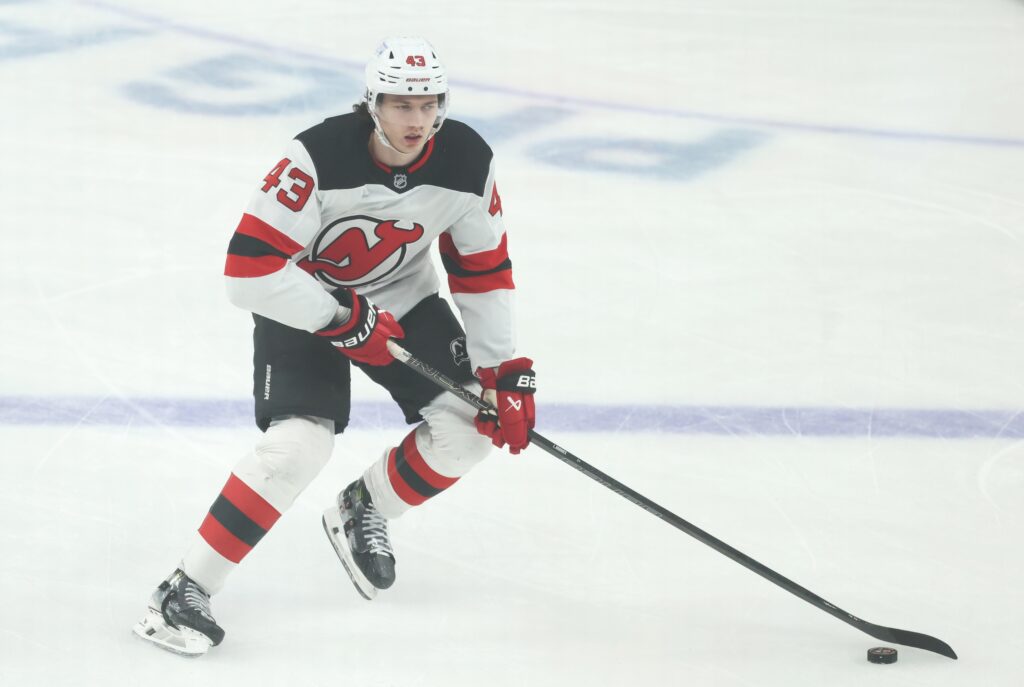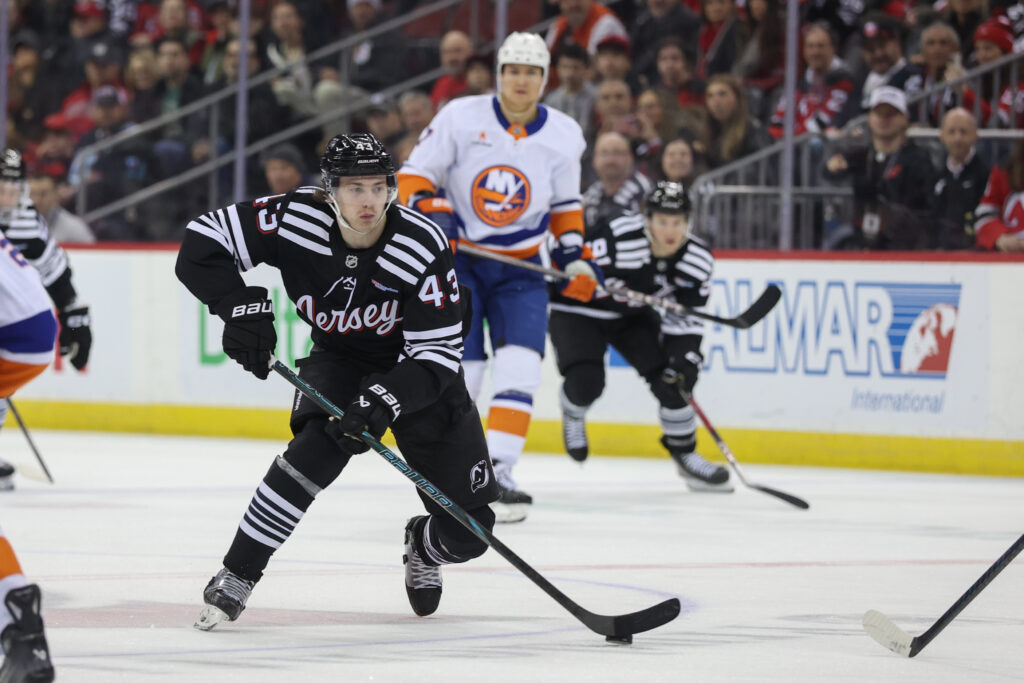On the surface, it should be simple. The New Jersey Devils have a budding superstar defenseman in Luke Hughes, a player General Manager Tom Fitzgerald unequivocally called his “number one priority” to sign this offseason. With the puck set to drop on the 2025-26 season on October 9, getting Hughes’ name on a new contract seems like a straightforward, if expensive, piece of business. Yet, here we are, in the waning days of August, and the Devils’ most important restricted free agent remains unsigned.
The delay isn’t born from a question of if Luke Hughes will be a Devil, but for how long. This negotiation has morphed into a complex chess match, a battle of timelines and philosophies with implications that stretch far beyond one player’s salary. It’s a standoff that pits the franchise’s desire for long-term security against a powerful family’s vision for their collective future.
All in the Family: The Hughes’ UFA Strategy
To understand the sticking point, you have to understand the Hughes family dynamic. Luke’s camp, by all accounts, is pushing for a five-year contract. In a vacuum, this seems like a reasonable mid-length term. But in the context of the Devils’ roster, it’s a strategic masterstroke for the player and a potential nightmare for the team.
The magic number is 2030. That’s the year this proposed five-year deal would expire. It’s also the very same year that the eight-year, $64 million contract of his older brother and franchise centerpiece, Jack Hughes, comes to an end. The intention is crystal clear: the brothers want to hit the open market as unrestricted free agents (UFA) in the same summer.
This isn’t about Luke wanting out of New Jersey tomorrow. It’s about securing maximum leverage and control over their collective destiny five years from now. Imagine the scenario in the summer of 2030: two of the league’s premier talents, a franchise forward and a cornerstone defenseman, both brothers, available to the highest bidder. They could re-sign as a package deal in New Jersey, or they could walk, hand-in-hand, to any other team in the league, fundamentally altering the landscape of two franchises in a single offseason. It’s a power play of the highest order, and it’s a scenario that is understandably keeping Tom Fitzgerald up at night.
The GM’s Nightmare: Why Five Years is a Four-Letter Word
For the Devils’ front office, the five-year term is seen as the “worst option” on the table. Standard NHL team-building practice dictates that you avoid walking a young, cornerstone player directly to unrestricted free agency if you can help it. Giving up team control for zero UFA years in return is simply bad asset management.

New Jersey has countered with two more traditional frameworks. The first is a short-term “bridge” deal, likely for three years. This would give Hughes a handsome raise now while keeping him a restricted free agent upon expiry, forcing another negotiation where the Devils still hold his rights. It’s a “show me” contract that bets on the team having a better read on his ultimate ceiling—and a higher salary cap—in 2028.
The second, and likely preferred, option is a maximum eight-year extension. This would buy out multiple UFA years, lock in Hughes as a foundational piece for the better part of a decade, and provide long-term cost certainty. It’s the path teams take with players they believe are true franchise cornerstones, eliminating any flight risk and making him an integral part of their long-range plan.
The pushback against the five-year deal is about mitigating a doomsday scenario. The Devils have invested years of high draft picks and development into building a core around the Hughes brothers. The idea of both being able to walk away simultaneously in 2030 is an existential threat to that entire blueprint.
The Vancouver Connection: How Quinn Hughes Looms Over Newark
Complicating matters further is the “ghost of Hughes future”—the eldest brother, Quinn. The Vancouver Canucks captain and Norris Trophy-caliber defenseman has a contract that expires in 2027. The hockey world has long speculated about the tantalizing possibility of a Hughes brothers reunion in New Jersey, a notion even Canucks President of Hockey Operations Jim Rutherford has acknowledged is on his radar.

Acquiring a player of Quinn’s stature would be a monumental task, but the biggest selling point the Devils have is the chance to play with his brothers. However, that allure diminishes significantly if Jack and Luke’s contracts are set to expire just three years after Quinn could potentially arrive. A five-year deal for Luke makes the “Hughes Triumvirate” a far more tenuous and risky proposition. If Fitzgerald hopes to one day build a true family dynasty in Newark, he needs the foundational pillars of Jack and Luke cemented in place long-term, not with synchronized exit ramps.
Breaking the Bank: The Market for Elite Young Defensemen
Regardless of the term, Luke Hughes is about to get paid, and his statistical output provides all the ammunition his agent needs. Turning 22 on September 9th, Hughes has already amassed 93 points in 155 career games. His 91 points over the last two seasons, split between a 47-point rookie campaign and a 44-point sophomore effort, place him in elite company.
Consider the recent contracts handed out to comparable young defensemen. K’Andre Miller, now with the Carolina Hurricanes, signed an eight-year deal with a $7.5 million AAV; Hughes has out-produced him by 34 points over the same two-season span. Noah Dobson of the Montreal Canadiens inked an eight-year pact worth $9.5 million annually; Hughes is only 18 points behind him and is four years younger. While a player like Washington’s Martin Fehervary (seven years, $6 million AAV) is more of a two-way specialist, Hughes’ offensive production dwarfs his.
The most significant factor in Hughes’ favor is his age. At 21, he is significantly younger than those comparables were when they signed their deals. His value is still “apexing,” meaning the Devils would be paying for his prime years, not just his developed potential.
This puts the financial projections in stark relief. An eight-year, maximum-length contract would likely land somewhere between $72 million and $80 million, carrying an average annual value (AAV) in the $9 million to $10 million range. A three-year bridge deal would offer the Devils a temporary discount, perhaps in the neighborhood of $6.5 million per season for a total of $19.5 million, but it would only be kicking a much larger, more complicated can down the road.
The clock is ticking. This negotiation has evolved beyond dollars and cents into a fundamental battle over control and vision. Will the Devils secure their defensive cornerstone for the next decade, or will they cede to a five-year plan that aligns with family but introduces a new level of franchise uncertainty? Something has to give, and the future architecture of the New Jersey Devils hangs in the balance.
Created with the aid of Gemini AI
